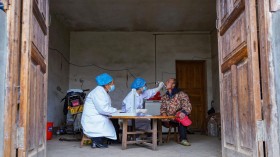In the process of validating a new method for calculating physical activity, sedentary behavior and food energy requirements, researchers from University of South Carolina's Arnold School of Public Health found that as a nation, Americans spend more than 15 hours per day sleeping and sitting, and that obese men and women spend less than one minute per day in vigorous activity.
The study, led by Arnold School exercise scientist and epidemiologist Edward Archer and published in the journal Mayo Clinic Proceedings, used accelerometry based technology to validate a protocol for calculating energy expenditure and food energy requirements. This study of the Physical Activity Ratio (PAR) protocol provides the first national estimates of total daily energy expenditure, physical activity and sedentary behavior for the US population, according to a press release announcing the findings.
"In the past, physicians and researchers used questionnaires to obtain estimates of lifestyle factors such as physical activity, exercise, sedentary behavior, and diet," Archer said. "Unfortunately, this method rarely provided accurate or reliable data, and without valid estimates, public health policy and food-based guidelines are ineffective and/or counterproductive."
"Conventional wisdom and research over the past five decades suggest that obese men and women engage in less physical activity than normal weight individuals," Archer said. "With results from this study taken into account, and the overwhelmingly sedentary nature of the current U.S. population, the message to 'move more, sit less' is sound, empirically supported advice that is easily understood by health care professionals and the public."
The study used data sets from the National Health and Nutrition Examination Survey 2005-2006 and included adults age 20 to 74. The samples were then divided into three categories based on Body Mass Index (normal, overweight or obese) and controlled for all factors contributing to energy expenditure.
The study found that obese men and women were significantly less physically active and spent more time in sedentary behaviors than their normal weight counterparts. These groups also got less sleep and spent almost no time engaged in more intense forms of physical activity. "Given that physical inactivity is now a leading cause of death and disability in the world, these data are essential in advancing the science of obesity and health," Archer said.
© 2024 NatureWorldNews.com All rights reserved. Do not reproduce without permission.




![Microplastics Escape Body's Gut to 'Infiltrate' the Brain, Kidneys and Liver [Study]](https://1471793142.rsc.cdn77.org/data/thumbs/full/70195/280/157/50/40/microplastics-escape-bodys-gut-to-infiltrate-the-brain-kidneys-and-liver-study.jpg)
